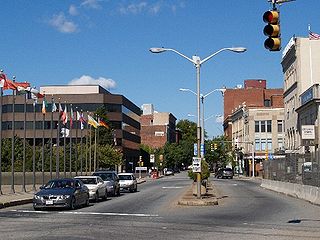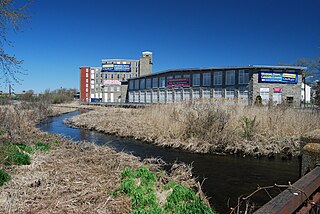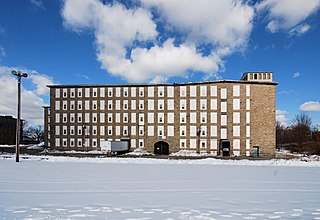
Fall River is a city in Bristol County, Massachusetts, United States. Fall River's population was 94,000 at the 2020 United States census, making it the tenth-largest city in the state. It abuts the Rhode Island state line with Tiverton, RI to its south.

The Quequechan River is a river in Fall River, Massachusetts, that flows in a northwesterly direction from the northwest corner of the South Watuppa Pond through the heart of the city of Fall River and into the end of the Taunton River at Mount Hope Bay at Heritage State Park/Battleship Cove. The word Quequechan means "Falling River" or "Leaping/Falling Waters" in Wampanoag, hence the city's name.

Pocasset Manufacturing Company was a cotton textile mill located in Fall River, Massachusetts. It was located just west of Main Street across the second falls of the Quequechan River. It was organized on August 15, 1821, with $100,000 in capital. The mill began operation in 1822, with Samuel Rodman of New Bedford as the principal owner. Oliver Chace, served as the mill's agent until 1837. Nathaniel Briggs Borden was named clerk and treasurer.

Oliver Chace was an American 18th and 19th-century businessman. He was the founder of several New England textile manufacturing companies in the early 19th century, including the Valley Falls Company, the original antecedent of Berkshire Hathaway, which as of 2019 is one of the largest and most valuable companies in the world.

Nathaniel Briggs Borden was a businessman and politician from Fall River, Massachusetts. He served as a U.S. Representative from Massachusetts's 10th congressional district from 1835 to 1839 and again from 1841 to 1843. He later served as a member of the Massachusetts General Court, first as a state Senator, and later a state representative. He also served as the third mayor of Fall River. His business career included interests textile mills, banking and railroads. He was the younger brother of noted land surveyor Simeon Borden.

Berkshire Fine Spinning Associates was an American textile company, founded in 1889 as Berkshire Cotton Manufacturing Company in Adams, Massachusetts in Berkshire County, Massachusetts.

For much of its history, the city of Fall River, Massachusetts has been defined by the rise and fall of its cotton textile industry. From its beginnings as a rural outpost of the Plymouth Colony, the city grew to become the largest textile producing center in the United States during the 19th century, with over one hundred mills in operation by 1920. Even with the demise of local textile productions during the 20th century, there remains a lasting legacy of its impact on the city.

The American Printing Company, located in Fall River, Massachusetts grew to become the largest producer of printed cotton cloth in the United States by the early 20th Century. The company grew as an offshoot of the Fall River Iron Works, established in 1821 by Colonel Richard Borden and Major Bradford Durfee. The American Print Works was established in 1835 by Holder Borden. It employed several thousand workers at its peak during World War I.

The Metacomet Mill, built in 1847 by Colonel Richard Borden for the manufacture of cotton textiles, is the oldest remaining textile mill in Fall River, Massachusetts.

The Border City Mill No. 2 is a historic cotton textile mill at One Weaver Street in Fall River, Massachusetts. Built in 1873, it is the largest surviving element of the once-sprawling Border City Mill complex. It was designed by Josiah Brown, a prominent local designer of mills, and is one of the city's few brick mills. It was listed on the National Register of Historic Places in 1990. It was converted into residences in the 1980s.

Chace Mills is a historic textile mill complex on Lewiston and Salem Streets in Fall River, Massachusetts. Built in 1872, it is one of the city's most visible historic mills, with a particularly fine Italianate stair tower. The complex was added to the National Register of Historic Places in 1983.

The Lower Highlands Historic District encompasses one of the oldest residential areas of Fall River, Massachusetts. The district is roughly bounded by Cherry, Main, Winter, and Bank Streets, and is located just east of the Downtown Fall River Historic District and directly south of the Highlands Historic District. This area was settled by 1810, has architecture tracing the city's growth as a major industrial center. The historic district was added to the National Register of Historic Places in 1984.

Flint Mills is a historic textile mill complex located on Alden Street in Fall River, Massachusetts, near the banks of the Quequechan River. The company was founded in 1872 and named in honor of John D. Flint, who served as its first president. The original 1872 mill burned in 1882, and was rebuilt in 1883. The complex was later expanded with a second mill and large addition in 1909. The site also contains a detached granite mill office building. The section of Fall River surrounding the mill became known as "Flint Village". The site was added to the National Register of Historic Places in 1983.

The Old Colony Iron Works-Nemasket Mills Complex is a historic industrial site located on Old Colony Avenue in the East Taunton section of Taunton, Massachusetts, United States, adjacent to the Taunton River at the Raynham town line. The site was first occupied by the Old Colony Iron Company, which had originally been established in the 1820s as Horatio Leonard & Company. The western part of the complex was sold to Nemasket Mills in 1889. The eastern part was acquired by the Standard Oil Cloth Company. The site was added to the National Register of Historic Places in 1984.

The Whittenton Mills Complex is a historic textile mill site located on Whittenton Street in Taunton, Massachusetts, on the banks of the Mill River. The site has been used for industrial purposes since 1670, when James Leonard built an iron forge on the west bank of the river. The first textile mill was built in 1805 and expanded throughout the 19th century. The complex was added to the National Register of Historic Places in 1984, and now contains various small businesses.

Granite Mills are two historic cotton textile mills located on Bedford Street in Fall River, Massachusetts, consisting of Granite Mill No. 2 and Granite Mill No. 3. The site was determined eligible to be listed on the National Register of Historic Places in 1983, but was omitted due to owner's objection.

Beverly Cotton Manufactory was the first cotton mill built in America, and the largest cotton mill to be built during its era. It was built hoping for economic success, but reached a downturn due to technical limitations of the then early production process and limitations of the machines being used. Being the birthplace and testing grounds of the cotton milling industry at the time, it has been called the birthplace of the American Industrial Revolution.

The Fall River Manufactory was the first cotton mill to be constructed across the Quequechan River in Fall River, Massachusetts, United States. It was also the first successful textile mill in the area.

Tecumseh Mill No. 1 is a historic cotton mill located at 164 Hartwell Street in Fall River, Massachusetts. It was built in 1866, and added to the National Register of Historic Places in 1983 as part of the Corky Row Historic District. Tecumseh Mills No. 2 and No. 3 were located nearby on Plymouth Avenue, but have since been demolished.




















